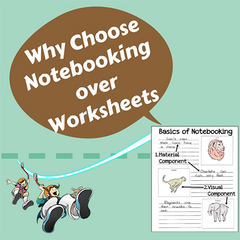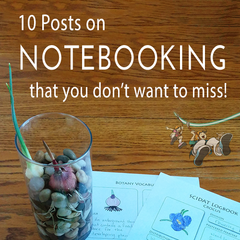FREE Shipping on all our products! (Please expect 1 to 1.5 weeks for delivery due to transit delays. We ship every day including Saturday
FREE Shipping on all our products! (Please expect 1 to 1.5 weeks for delivery due to transit delays. We ship every day including Saturday
Should you bother with preschool science in your homeschool? And how to do it if you should.
January 27, 2020 4 min read

We know that our preschoolers need to learn the basics. We don’t question if we should teach them the colors, the alphabet, and the numbers 1-20. We provide them with structured play, such as a kitchen set or a dress-up station, and we make sure that they have time to build their motor skills by creating art and exploring music.
And all that is very good and very necessary!
However, all too often, we neglect to introduce our youngest students to the wonder of science because we think it is too difficult of a subject for them to grasp. And while some concepts in science will go way over a preschooler’s head, we can introduce them to the basics of science by presenting them with the wonder that surrounds us each and every day.
(This post is part of our "how-to teach science" series<-click the link to see the rest of the tips.)
A case for having preschool science as part of your homeschool
Preschoolers are naturally wired to be curious, which means that they are fully prepared to learn about the world around them.
These early years are a good time to introduce our children to science. We can introduce them to science by presenting them with the concepts found in their environment or in simple scientific demonstrations.
And as a bonus, by showing them the miracle of science all around them, you are building a basis for future learning!
What should preschool science look like?

Preschool students are completely blank slates, so you will want to introduce them to various concepts and ideas found in science through a hands-on approach. This will help them to build a basic framework, or bucket, they can fill during the elementary years.
So, your goal for preschool science is simple – to introduce your preschooler to the world around them.
Now, you can certainly accomplish this goal by capturing moments and chasing rabbit trails. But you can also present your preschooler with those “ahh-mazing” moments through a preschool science program.
When looking for a “formal” preschool science program, you want to see four basic components.
- The Weekly Topic – The weekly topic is the main idea that will guide your studies for the week and it is best to put it into words your preschooler will understand.
- Hands-on Projects – Hands-on projects are simple scientific demonstrations and nature studies that will present the “ahh-mazing” parts of science to your preschooler.
- Read-alouds – Non-fiction read-alouds will provide your preschooler with information on the weekly topic. We love the Let’s-Read-and-Find-Out series, but your local library should have a good selection of non-fiction books that your child will find interesting.
- Coordinating Activities – Activities that relate to the weekly topic will reinforce the weekly topic. You can use crafts, snacks, simple finger plays, or songs to enhance your child’s learning. These activities should be fun!
As you go through these activities, you can create a journal or scrapbook of what you do. These science journals are fun to look back at when your kids get to high school, but even so, they are optional.
The main point of preschool science is to introduce your student to science in an interesting way.
In fact, what you accomplish each week will vary because your preschooler’s interests will vary. Some weeks, your child will want to spend every waking minute learning something; other weeks, that same child will only want to spend five minutes on any type of educational topic.
Look at your preschool science plans as an exciting buffet of ideas you can use to introduce your preschooler to the world of science, rather than a boring list of things to check off each week.
Preschool science in a nutshell
Preschool science is about capitalizing on the rhythms of life and sharing the wonders of science in the context of something your child finds ahh-mazing.
You can share science with your preschooler by chasing rabbit trails or by presenting weekly topics to explore through hands-on projects, read-alouds, and coordinating activities. Whether you choose an informal or a formal approach to preschool science, you are laying a foundation for success in the future years.
If you want a more in-depth look at preschool science, check out the following podcast series:
- Episode 61 – The Early Years Part 1: Goals
- Episode 62 – The Early Years Part 2: Tools
- Episode 63 – The Early Years Part 3: Methods
And that's a wrap! If you have more questions about preschool science, please feel free to leave them in the comments below.
Psst...Need help with preschool science?
Okay, I did have one more thing to say. If you need help, we have got you covered with several options of complete plans for preschool science. Here are the options:
- From the Classical Science Series - Intro to Science provides you with the tools you need to introduce your students to the wonderful world of science. In the teacher guide you will find scripted introductions, options for hands-on activities, and suggested reading selections, plus a variety of coordinating activities to do throughout the week. Your students can document their journey using the scrapbook-style student diary or the simple lapbooking templates. Either way, Intro to Science has a buffet of options that are perfect for your students first-look at science!
- From the Sassafras Science Series - Summer's Lab gives you the tools you need to guide your students through their first hands-on look at science. In the teacher guide you will find a science-sandwich twist on scripted introductions, hands-on activities, and suggested reading selections, plus a variety of coordinating activities. Your students can document their journey using the scrapbook-style student journal or the simple research notes templates. Either way, Summer's Lab is packed with silly-scientific fun, just right for your students first-look at science!
You can also check out our unit study option for preschool science - Learning through Science.
Also in Elemental Science Blog
What is the difference between a report and a research paper for science?
May 13, 2024 2 min read

In the middle school and high school years, students frequently receive assignments for research papers or reports in science and history. But what is the difference? And how to you go about writing both of these? Click "Read More" to get answers.
Why Choose Notebooking over Worksheets? Here are 3 Reasons...
May 06, 2024 2 min read

Why choose notebooking over worksheets? Click "Read More" to see three reasons why we have chosen notebooking over worksheets.
10 Posts On Notebooking That You Don’t Want To Miss
April 22, 2024 3 min read

We love notebooking at Sassafras Science! And these ten posts on notebooking will help you understand the how's and why's of this super effective tool.
Subscribe
Sign up to get the latest on sales, new releases and more …

